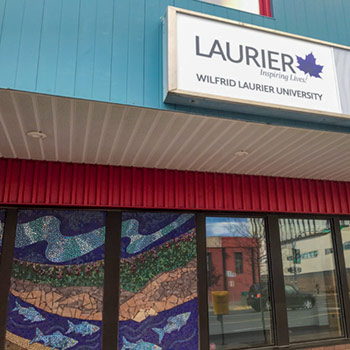Wilfrid Laurier University is opening a research office in Yellowknife, Northwest Territories (NWT), which will allow it to further develop its national and international leadership in cold regions research.
The office, which is located in the W.H. Bromley Building in downtown Yellowknife, is home to year-round staff, primarily research associates and postdoctoral fellows. It also provides a workspace to visiting faculty, students and staff. It is a base for Laurier’s research activities in the North and for liaising with partners, including various levels of government and Indigenous communities.
“Laurier has a longstanding commitment to research and to local communities in the Northwest Territories,” said Robert Gordon, Laurier’s vice-president research and acting provost. “Establishing a research office in Yellowknife will allow us to maintain an ongoing presence in the North, expand our capacity for year-round research, and deepen our relationships with our partners.”
Laurier established a research partnership with the Government of the Northwest Territories (GNWT) in 2010 to expand the NWT’s capacity to conduct environmental research and monitoring, and to enhance its ability to manage its natural resources for future generations.
Laurier’s research priorities in the North include research on climate change, water, permafrost, forest ecology, northern food security and infrastructure development. As an institution, Laurier considers research on the environment, particularly climate change, to be among its highest strategic priorities.
“Having a home base in Yellowknife will help us build upon the strong partnerships we have been able to develop through our research in the NWT,” said associate professor Jennifer Baltzer, Canada Research Chair in Forests and Global Change and co-principal investigator of Northern Water Futures (NWF), a project of the University of Saskatchewan-led Global Water Futures program, which will be a major focus of the research based out of the Yellowknife office. Associate Professor William Quinton, director of the Cold Regions Research Centre, is the other NWF principal investigator.
“Being based in Yellowknife gives us a full-time presence in the region, and better access to our research sites and our partners,” said Ryan Connon, senior research associate in hydrometeorology and the head of the Yellowknife office. “Laurier is a leader in cold regions research and this office will help us expand the work we do in the NWT to continue to support our northern partners.”
Although there will be no university classes held at the office, it will periodically host special events in Yellowknife at which the public can learn about Laurier’s research and partnerships. The office will also serve as a base for organizing community outreach activities elsewhere in the Northwest Territories.
The Yellowknife office is just part of Laurier’s commitment to the North. Laurier’s Changing Arctic Network (CANet) research team is using $8.2 million in funding from the Canada Foundation for Innovation, the GNWT and Laurier to build state-of-the art research stations throughout the North. The funding will also support 20 “living laboratories,” each representing a widely occurring bio-physical environment, as well as updates to three environment and natural resources laboratories in the NWT.
The office will host a grand opening on Sept. 25th, as well as a panel discussion on Laurier’s northern research at the Prince of Wales Northern Heritage Centre.









